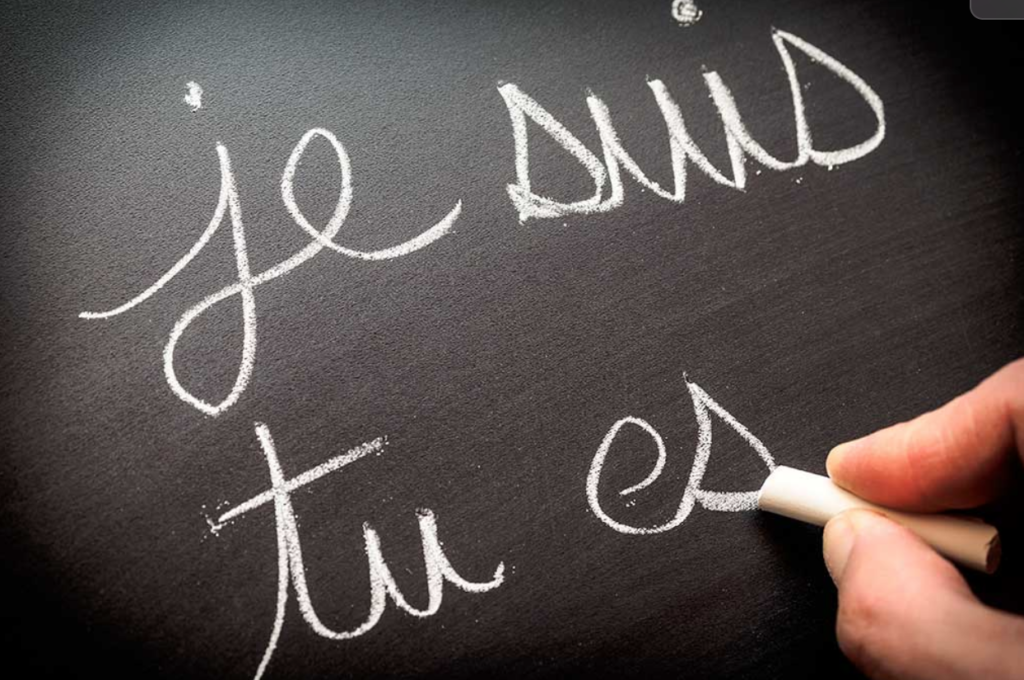Bumbling along in one of the most beautiful cities in the world with my rudimentary language skills.

One of my dear friends (and my former boss back in my advertising hey day…😄) has the most amazing brain that is always curious and hooked into whats happening here, there and everywhere. She is coming to visit and I couldn’t be more excited to trail her around this city that she knows better than me. She has also been a wonderful resource sending me so many interesting articles about living in Paris/France.
When one moves to a foreign country, one of the best ways for it to cease to feel foreign is for you to be able to converse in the language. Well, I have a little experience in speaking French but I am definitely not where I would like to be. That said, I keep plodding away with lessons and enthusiasm. (I suspect both are of equal importance! ;o)
But my aforementioned friend sent me an article about the French and how their language informs how they communicate. I found it super interesting.
Apparently the English language has 500,000 words and French has 70,000. I am sort of stumped to hear this. French is rumoured to be THE language of love afterall….maybe keeping it simple makes it sexiest?! I have no idea but as always, color me intrigued.
I also have to admit to feeling weirdly grateful to have english as a my first language if the bit about word use is correct. I am someone who LOVES words. I love learning vocabulary and I am weirdly obsessed and delighted with knowing as many of our words as possible. Afterall, the ability to very precisely articulate my thoughts and ideas is of great importance to me.
I just enjoyed a visit from a very dear longtime friend and we were speaking about our human frailities. She said she had realized she has a deep desire to be liked and accepted. I said I could understand that, and that my own fraility is similar but with a twist. I have a deep need to be understood. And for that reason, the ability to hold an arsenal of vocabulary to enable articulation of my perspective is a huge joy.
So this means the discovery that the French language, again…perpetuated to be one of the most endearing and romantic in the world, contains only 70,000 words is so surprising to me. Mais, ce n’est pas possible! How do the French manage to sound so damn sexy and beautiful with their, can I say it, *limited* language?!
So of course now I’m thinking, and I’m observing how our languages differ.
I went to the gym today after 5 (very sad) days off because of a very unfortunate mancold. (I am really getting some milage out of this whole mancold thing. Usually I get a bug and throw it off, but this bug really grappled on with a vengeance and definitely deserved the ‘mancold’ moniker, but i digress…) Do the French “digress”? More likely they ‘step’ or ‘pass’ or something else that they also do in 25 other situations.
For that is what I have determined is the difference between French and English. In English we are super specific and super direct. We have a specific word to describe precisely what we mean. The French are more laissez-faire with the whole concept of words. The same word can be used to mean a few different things depending on which words precede it and which come after.
I love this concept of french language because in practical terms it means you are playing russian roulette on a daily basis, haha. Here is what I mean….getting back to the gym. (See I always loop around even if it takes me a while.)
So I’m back at the gym this morning and the lovely gentleman there asks how I am and I can tell by his intimation that he recognizes I’ve been absent. I’m not in the habit of whining about maladies but I do like to try and make conversation and I could tell he had noticed my absence so I prepared myself to say ‘I was sick.” I said “J’etais” and paused while I searched for the word ‘sick’.
He looked on with interest as I paused. In my mind I knew I had said “J’etais…” as in “I was” but it also sounds like ‘jete’ (or jetee, or jetes, or jetees) which google (translate) tells me, means ‘throw’, but years of ballet also tell me it means ‘jump’, as in ‘Grand Jete’, so while i paused for a micro second to search for the word ‘sick’, he was actually no closer to knowing what I was about to say.
It took the word “malade” after the “j’etais” for him to know I was whining about having been sick, as opposed to saying something weirdly random about throwing or jumping. And this examplifies EXACTLY what I have experienced in blundering around trying to speak French: that the specific words mean less actually than their context and relation to the words on either side of them.
I am happy admitting that I am a total weirdo who thinks of things like this, but it is a really fascinating concept to me about the power of context. It also explains why the French are perceived as being ‘subtle’ and perhaps a bit ‘circumspect’. Their subtlety comes from their lack of word choice I think. Can I say that?! It’s not meant to be critical, it’s just meant to be an observation. I am constantly surprised to type different things into Google Translate for help in relaying what I want to say and seeing the same words for different meanings.
In the article my friend sent to me,
“context includes tone, body language, setting and situation.” INSEAD Business School Professor Erin Meyer identifies 8 scales to demonstrate how different cultures relate. She says countries like the US and Australia are low-context cultures where people generally say what they mean. However France, like Russia and Japan, tends to be a high context culture, where good communication is sophisticated, nuanced and layered. Messages are both spoken and read between the lines.”
Meyer explains that because the French have access to fewer words than English speakers, Francophones must string together a series of words to communicate their message. “This not only forces the French to be more creative with language, it also allows them to be more ambiguous with what they want to say.”
Wow….I have to sit with that for a moment. I already feel duped somehow. I am not someone who favors ambiguity and it’s a challenging concept to realize it’s a fundamental underlier for some of the world’s languages. I can see this needs to be a new challenge for me: to accept, and groan….’learn to enjoy’…lack of clairity. Gaaaaa, it makes my eye twitch just even considering it….wink, wink. Why would less clear be better?!
In the article Meyers explains how these differences affect how different cultures conduct business meetings. The French have grown up with the concept that no doesnt mean no (and I’m NOT making reference to consent during sex but that is an interesting aside I now think.) Anyway, in French, ‘no’ may mean no, yes or maybe. Apparently it is taught in school to argue one’s point from both sides and then to draw a summary, hence when French business people say ‘no’ they are often actually meaning to open and invite a discussion for debate. Huh. Is that so?!
And….apparently there are a bouquet of ‘no-s’ which can mean a variety of things.
Groan!…a bouquet of ‘no-s’ which mean a whole host of differing things?! Mon Dieux! I am clearly such an Anglophone!!! I thrive on clear specific precise communication. This whole ‘no might mean 10 things situation’ does not make immediate sense to me….especially because as a Canadian, I was raised to be ‘respectful’. Generally speaking, if Canadians are told no, we tend not to argue the point, and instead ‘behave ourselves, and retreat.’
This cultural difference however does help me to understand how and why I felt so much irritation and frustration trying to get visas and then more recently trying to get a bank account and do other basic life activities.
Researchers suggest that the ‘no’ so favoured by the French comes from a cultural obsession with not wanting to be blamed for being wrong. Hmmm. And the practice of saying ‘no’ a few times before saying ‘yes’ seems so ingrained in culture that people factor it into their conversations and planning, even within families between husbands and wives.
Cultural consultant Polly Platt describes a scenario whereby she convinces her husband to go on a vacation to the place of her choosing. Platt says she knows her husband will automatically say ‘no’ to her first few suggestions so knowing this she puts out some decoy suggestions that are not her actual choice. As predicted her husband says no to her first 3 suggestions and then finally agrees on her last suggestion…which was actually her first choice.
OH. MY. GOD. REALLY?! This is a CULTURAL NORM?! Wow. I had no idea how North American I really am. I don’t have interest or patience for these kind of ‘games’. I know it risks sounding judgemental to refer to a cultural norm as being a game but I struggle to see it differently. (And Oh Dear, I hate it when I am confronted with how set in my ways I really am. It’s indeed a sobering thought. I thought I was adaptable and open minded. Apparently not…)
I can’t help but wonder if this same strategy relates to shopping for women? Does this mean she shows her male partner 3 items she has zero interest in before showing him the 4th item which is actually the one she covets? Good lord….what a time suck?! Who can be bothered with this farce?! My motto for shopping is ‘Get in, get the thing you want, get out!’ Wow…I am SO not French!!!
In the French language, “I love” and “I like” are the same?! What the actual heck?! I’ve seen that “I feel” and “I think” also have one translation…and yet they are NOT the same thing I would argue! I will start to keep track of other examples because there truly have been so many, already!… (And I’m pretty sure Ms. Meyers is waiting with baited breath for my elucidating perspective complete with examples to hit her inbox….bahahaha.) And it is only because I have a little prior experience with French that I can read the suggested translation when it’s offered to me and then go back in and search for an existing French word that better articulates what I want to say.
But for now whether I like or love something remains for the listener to decide. No wonder the French are considered some of the world’s best lovers?!…. 😉✨
This article (link below) explaining how/why the French don’t get ‘excited’ is also fantastic. It explains how the French live in the verb of ‘to be’ whereas as North Americans we live in the land of ‘to do’ or ‘to have’. We live in the future and it could be argued it’s to our detriment. We are always planning and looking forward, often forgetting to just sit and enjoy the now.
The article further articulates our cultural differences. It is also a great reminder never to tell a French person you are excited unless it’s intended as a romantic overture because in French ‘excited’ references physical stimulation or arousal. In French ‘arousal’ and ‘emotional enthusiasm’ must share a verb. C’est vraiment dommage, non?…
http://www.bbc.com/travel/story/20181104-why-the-french-dont-show-excitement
